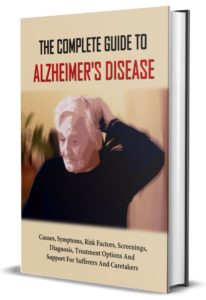By Shawn Lazarus on February 5, 2025
The Face of Alzheimer’s Disease
Walking may slow cognitive decline in adults with mild cognitive impairment (MCI) and Alzheimer’s disease, as well as in healthy adults, according to a study presented today at the annual meeting of the Radiological Society of North America (RSNA). Read more on News-Medical-Net
Perhaps you’ve witnessed close friends or relatives become a shell of their former selves as their mental abilities wither away from the debilitating effects of Alzheimer’s disease. It is a truly tragic occurrence to endure. If you haven’t been in this unfortunate position, consider yourself very lucky.
Currently, more than 5 million people suffer from Alzheimer’s disease in the United States. Approximately 12.5% of Americans older than 65 are at risk for Alzheimer’s, and that figure jumps to a staggering 50% for those over 85. As the baby boomer generation approaches their mid 60’s, you will most likely see these figures rise even higher.
Currently, there is no 100% proven method of prevention against Alzheimer’s disease. It is a complex and nuanced disorder, and while doctors and researchers are making great strides, they are still not fully certain as to all of the causes and best prevention practices.
However, recent discoveries point to the fact that prevention against Alzheimer’s disease lies mainly in how you live your life. As with many other devastating diseases such as cancer, heart disease and stroke, adapting healthy lifestyle practices has been found to be the best way to prevent Alzheimer’s.
4 Pillars of Alzheimer’s Prevention
“We have to realize that the era of the magic bullet – drugs for the treatment of Alzheimer’s disease – is over. We need to take an integrative approach, like they do for heart disease. What works for the heart, works for the head,” contends Dr. Dharma Singh Khalsa, M.D., President and Medical Director of the Alzheimer’s Research and Prevention Foundation.
Dr. Khalsa has been working to fight Alzheimer’s disease with the non-profit ARPF since 1993. He has developed his “4 Pillars of Alzheimer’s Prevention” which he asserts are the most effective way to avoid developing the disease.
Pillar 1 – Diet and Vitamins
According to Dr. Khalsa, a proper Alzheimer’s prevention diet should consist of 20% “good” fat (including extra virgin olive oil, avocado, and flaxseed oil), 40% lean protein (especially fish), and 40 % complex carbohydrates and vegetables.
It is important to avoid a diet high in trans-fat, saturated fat, and cholesterol. Eating foods rich in anti-oxidants is very important. Many foods high in vitamins C and E are also rich in anti-oxidants. Blueberries, grapes, cranberries, papaya, apples, and green leafy vegetables are all a good source of anti-oxidants.
Omega-3 fatty acids, found in salmon, trout, albacore tuna, and spinach, help prevent the build-up of plaques in the brain. It’s also important for you to take a high potency multi-vitamin that contains folic acid and vitamin C.
Pillar 2 – Stress Management
High cholesterol, high blood pressure, and high cortisol levels can all lead to developing Alzheimer’s. And stress is a major factor in all of these conditions.
Cortisol is a stress chemical released in your body. In excess, it damages the cells in your brain’s memory center. And as stress and cortisol levels increase, your chances for memory loss increase dramatically.
Regular stress relaxation practice has been shown to improve focus, attention, and mental performance. Some practical stress management techniques include meditation, yoga, hypnosis, relaxation exercises, prayer, and deep breathing.
Pillar 3 – Mind and Body Exercise
It is important to engage in both physical and mental exercise on a regular basis. Research has shown a link between cardiovascular health and brain functioning. This makes perfect sense, since your heart is responsible for pumping blood to your brain.
Physical exercise has been found to reduce your risk of developing Alzheimer’s by as much as 50%. The following activities will provide you with a more than adequate regimen of physical activity to keep your brain healthy: 30 minutes of regular brisk walking, jogging, dance classes, swimming, hiking, and regular participation in sports.
It is also important to engage in a variety of mental activities. Mental exercise can reduce your risk for Alzheimer’s by 70%.
Stimulating the brain can increase the number of brain cells you have as well as the connections between these cells. It can also strengthen your current brain cells.
Dr. Khalsa stresses the importance of participating in a variety of mental exercises. The mind is kept sharper when activities are varied and new. Sticking to the same routine mental exercises doesn’t help maintain brain functioning very much.
Some good activities for maintaining healthy brain functioning include learning something new (a musical instrument, a foreign language, a hobby, etc.), memory games, taking a class, reading (especially challenging material), crossword puzzles and Sudoku games, and writing (stories, articles, poetry, memoirs, etc.).
Pillar 4 – Pharmaceuticals
Cholinesterase inhibitors are effective in slowing down the decline in cognitive abilities brought on by Alzheimer’s. Other drugs that are commonly used to treat the disease include Aricept, Exelon, Namenda, and Razadyne.
Always make sure to consult your doctor before using these medications, and go for regular check-ups to make sure that your body isn’t experiencing any harmful side effects from these drugs.
It’s never too early to start your program of prevention against Alzheimer’s disease. By adopting healthier lifestyle practices when you are young, you can enjoy better mental functioning as you reach the later years of your life.
– See this video below on a husband’s fight to keep his wife home who has developed Alzheimer’s Disease and how he is caring for her. Courtesy of CBS News

Shawn Lazarus is President and CEO of Advanced Elderly Services. A home care agency dedicated to senior care services at home, and managing the caregivers who are the corner stone of care. We have developed a service to help, and assist senior’s living in local communities at home needing Live-in and daily care services from professional caregivers, and home makers. We connect caregivers with seniors who truly need this service with a lot more ease and access. We do Live-in care services the correct way, with dedicated attention, to service. To schedule a free 30-minute need assessment visit, call us at:
1-610-352-6611 or 888-854-0950

There are only 2 options dealing with your senior loved one when it comes to care placement. Home care or Nursing Home care. Armed with this FREE eBook on the Causes, Symptoms, Risk Factors, Screenings, Diagnosis, Treatment Options And Support For Suffers And Caregivers... you can make an informed decision for your senior loved one.

